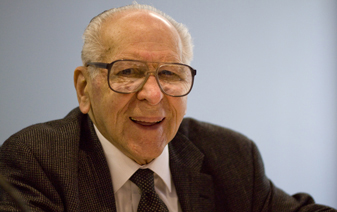If you talk to God, you are praying; If God talks to you, you have schizophrenia. If the dead talk to you, you are a spiritualist; If you talk to the dead, you are a schizophrenic
Fuente: The Second Sin, Anchor/Doubleday, Garden City, NY. 1973, "Schizophrenia", página 113 (101 en otras ediciones).
Fuente: Cita inicial en la web de The Thomas Szasz Cybercenter for Liberty and Responsibility http://www.szasz.com/
Frases célebres de Thomas Szasz
“Los hombres desean la libertad, pero al mismo tiempo la temen.”
Fuente: Szasz, Thomas (traducción de Pierre Sullivan ¿a qué idioma?). Idéologie et Folie, p. 42, 1976, éditeur PUF.
Cita inicial en la web de The Thomas Szasz Cybercenter for Liberty and Responsibility
Original: «If you talk to God, you are praying; If God talks to you, you have schizophrenia. If the dead talk to you, you are a spiritualist; If you talk to the dead, you are a schizophrenic».
Fuente: The Second Sin, Anchor/Doubleday, Garden City, NY. 1973, "Schizophrenia", página 113 (101 en otras ediciones).
Fuente: The Thomas Szasz Cybercenter for Liberty and Responsibility http://www.szasz.com/
Thomas Szasz Frases y Citas
Fuente: Szasz, Thomas (traducción de Denise Berger). Le Mythe de la maladie mentale, 1977, éditeur Payot [ref. incompleta]
Fuente: Szasz, Thomas (traducción de Denise Berger). Le Mythe de la maladie mentale, 1977, éditeur Payot [ref. incompleta]
Thomas Szasz: Frases en inglés
Fuente: The Manufacture of Madness: A Comparative Study of the Inquisition and the Mental Health Movement (1997), p. 170.
Fuente: The Myth of Mental Illness: Foundations of a Theory of Personal Conduct (1961), Chapter 10: The Ethics of Helplessness and Helpfulness.
Revised edition, 1985. p. 175.
Ceremonial Chemistry (1974)
Fuente: The Manufacture of Madness: A Comparative Study of the Inquisition and the Mental Health Movement (1997), p. 172.
The Untamed Tongue: A Dissenting Dictionary (1990)
"The Myth of Mental Illness" in American Psycholigist, Vol. 15 (1960), p. 115.
The Untamed Tongue: A Dissenting Dictionary (1990)
Fuente: Ceremonial Chemistry (1974), p. 11.
"Law", p. 40.
The Second Sin (1973)
Fuente: The Manufacture of Madness: A Comparative Study of the Inquisition and the Mental Health Movement (1997), p. 168.
"Science and Scientism", p. 116.
The Second Sin (1973)
Fuente: Anti-Freud (1990), pp. 56-57.
Fuente: The Manufacture of Madness: A Comparative Study of the Inquisition and the Mental Health Movement (1997), p. 203.
The Untamed Tongue: A Dissenting Dictionary (1990)
Fuente: The Second Sin (1973), p. 64.
Fuente: The Manufacture of Madness: A Comparative Study of the Inquisition and the Mental Health Movement (1997), pp. 208-209.
Fuente: Anti-Freud (1990), p. 67.
Fuente: The Second Sin (1973), p. 56.
Fuente: The Second Sin (1973), pp. 65-66.
Fuente: The Manufacture of Madness: A Comparative Study of the Inquisition and the Mental Health Movement (1997), p. 165.
"Science and Scientism", p. 115.
The Second Sin (1973)
Fuente: The Manufacture of Madness: A Comparative Study of the Inquisition and the Mental Health Movement (1997), p. 162.
The Untamed Tongue: A Dissenting Dictionary (1990)
"The Sane Slave: Social Control and Legal Psychiatry," American Criminal Law Review, vol. 10 (1971), p. 333.
"The Myth of Mental Illness" in American Psycholigist, Vol. 15 (1960), p. 113 http://psychclassics.yorku.ca/Szasz/myth.htm
Fuente: The Second Sin (1973), p. 45.
Fuente: The Manufacture of Madness: A Comparative Study of the Inquisition and the Mental Health Movement (1997), pp. 170-171.
Preface to the First Edition.
The Myth of Mental Illness: Foundations of a Theory of Personal Conduct (1961)
